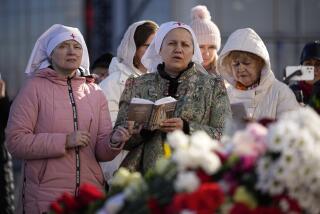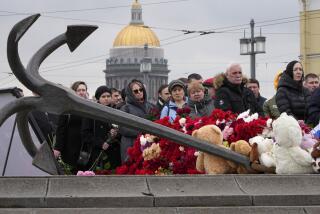Deal With Guerrillas Unnerves Russians : Chechnya: Millions wonder if they will be the next victims of deadly spillover from the war.
- Share via
MOSCOW — Russia’s failure to heed the maxim that negotiating with terrorists often risks more than it resolves has plunged this nation’s seemingly defenseless population into despair as millions wonder if they will be the next victims of deadly spillover from the war in Chechnya.
The Budennovsk hostage crisis was over with the release of the last captives Tuesday night, but a deep sense of vulnerability gripped Russia in its wake, and government moves to shore up defenses in the capital only served to remind people of their frayed security net.
Other tragedies like the one that took 100 lives in Budennovsk last week “will undoubtedly be repeated in a yet more horrible form,” Stanislav S. Govorukhin warned Wednesday in an address to the lower house of Parliament where he heads a commission investigating the causes of the Chechen conflict.
“Everything is possible in Russia, including an attack on a nuclear power plant which could be seized in no time by militants like [Shamil] Basayev,” he said, referring to the Chechen guerrilla leader who directed the deadly assault on Budennovsk.
During the dramatic incident in which Basayev grabbed more than 1,000 hostages to force Russia to cease its 6-month-old assault on separatist Chechnya, Russian citizens were made painfully aware of their exposure to terrorism; this happened in a society where the very forces charged with protecting the public--the police, army troops and a heavily armed secret service--are notoriously corrupt.
Basayev told journalists who followed his roving campaign of terror that his gunmen had managed to penetrate about 70 miles into Russia proper for the assault by bribing police at checkpoints that surround the war zone. “Perhaps Basayev was lying. But his words sound more than convincing to a Russian ear,” the daily Sevodnya observed, alluding to the general disrepute in which law enforcement is held in Russia.
Chechen rebel leader Dzhokar M. Dudayev had warned months ago that he would spread his fight for independence into Russia unless the government ceased its attempts to crush Chechnya’s drive for independence. “Now it has become crystal-clear that this war can thrust into each town, each home, each life,” the daily Sovietskaya Rossiya commented on the nation’s shattered sense of security.
The evening newspaper Vechernaya Moskva described the Budennovsk incident as dangerously precedent-setting because “the terrorists have eliminated the unwritten ban on the extermination of peaceful civilians.”
In the wake of the Budennovsk killings, security has been noticeably stepped up in Moscow. More than 16,000 army and security troops are being moved into the capital to beef up patrolling of vital utilities, public transport and foreign embassies, Russian news agencies reported Wednesday.
Armored vehicles and paratroopers now stand watch along the roads leading to Moscow, but security outside this city of nearly 10 million was thought to be little changed except for official appeals for people to be on their guard.
“People only feel more frightened when they see all these armed forces standing around,” said Tamara Agafonova, a retired government worker and Muscovite. “It’s as if they know that something terrible is going to happen here.”
The U.S. Embassy has issued a warning to Americans about the growing risk of terrorism in Russia and appealed to travelers to avoid Chechnya and other areas of the volatile Caucasus region.
Fears of further terrorist incidents were obvious in the frantic moves spurred by a bomb scare called in to authorities at Russian government headquarters Tuesday.
Police evacuated the vast riverfront building known as the White House for several hours as they searched for explosive devices. The Itar-Tass news agency noted that such hoax calls are not unusual, but that in the nervous wake of the Budennovsk crisis “no one is taking chances.”
Heightened security in Moscow resulted in a doubling of the normal arrest rate for the peculiarly Russian offense of visiting the capital without written permission. More than 12,000 people were detained Monday for lacking the appropriate documents, and a disproportionate share of the detainees were Chechens. Human rights groups this week renewed their criticism of police for harassing Russians from the Caucasus by singling them out for random document checks.
More to Read
Sign up for Essential California
The most important California stories and recommendations in your inbox every morning.
You may occasionally receive promotional content from the Los Angeles Times.











